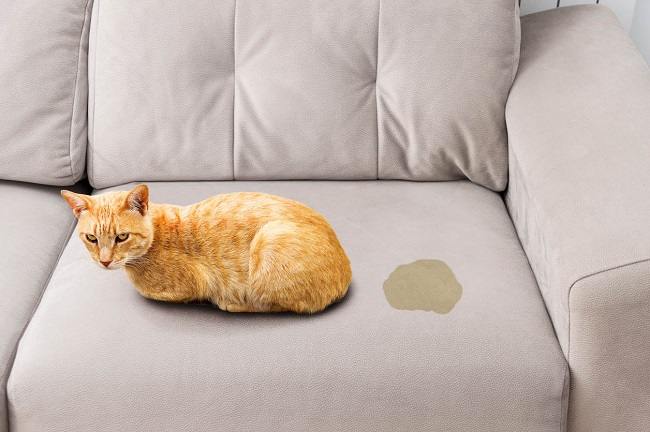Inappropriate peeing can be a challenging issue for cat owners. While it’s essential to rule out medical problems with a vet, once health issues are eliminated, behavioral interventions like homemade sprays can play a significant role.
This guide provides detailed instructions on creating safe, homemade sprays to stop cats from peeing in unwanted areas and shares practical tips for managing this common cat behavior issue.

Understanding Why Cats Pee Outside the Litter Box
Before you start using deterrents, it’s important to understand why cats might pee outside their litter box.
Read Also:
This behavior could be due to medical issues like urinary tract infections or kidney diseases, behavioral issues, or dissatisfaction with their litter box (unclean, location, type of litter).
Always consult with a veterinarian first to rule out health-related issues.
Creating Your Own Homemade Spray to Discourage Cat Peeing
Follow these methods to create a homemade spray:
1. Vinegar and Water Spray
Vinegar has a strong smell that cats generally dislike, making it an effective deterrent.
Ingredients:
1 part white vinegar
1 part water
Method: Mix equal parts of white vinegar and water in a spray bottle. Shake well to combine.
Usage: Spray the mixture in the areas where your cat tends to pee inappropriately. Avoid spraying on delicate fabrics without doing a patch test first.
2. Citrus-Based Spray
Cats aren’t fans of the smell of citrus fruits. A spray made from citrus peels can help deter your cat from peeing outside the litter box.
Ingredients
Peels from citrus fruits (oranges, lemons, or grapefruits)
Water
Method: Boil citrus peels in water, let the mixture cool, then strain it into a spray bottle.
Usage: Spray the citrus mixture in the targeted areas. Make sure to test the spray on a hidden area first to ensure it won’t damage or discolor surfaces.
3. Essential Oils Spray
Certain essential oils, like citrus oils and eucalyptus, can also deter cats. However, remember that some essential oils can be toxic to cats, so use this method cautiously and sparingly.
Ingredients:
1 part essential oil (citrus-based or eucalyptus)
3 parts water
Method: Mix one part essential oil with three parts water in a spray bottle.
Usage: Lightly mist the areas where you want to prevent your cat from peeing. Always avoid direct contact with your cat and don’t use the spray excessively as strong odors can be overwhelming for cats.
Safety Measures and Precautions
While homemade sprays can be a useful tool, they should be used responsibly. Never spray these mixtures directly onto your cat, and avoid areas they eat or sleep. Always observe your cat for any signs of distress or allergic reactions.
Read Also:
Conclusion
Inappropriate peeing can be a complex issue to resolve, but homemade sprays offer a natural and affordable solution to help manage this behavior.
Remember, these sprays should be part of a broader approach to address this issue, including veterinary consultation, maintaining clean litter boxes, and providing a stress-free environment for your feline friend.
Preventing unwanted behaviors in a gentle and understanding way reinforces a positive relationship with your pet and leads to a happier life together.
























